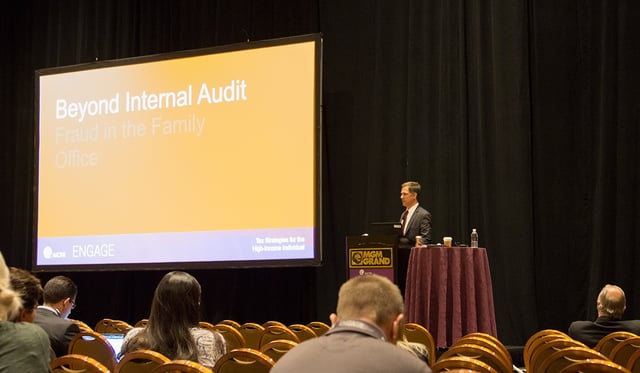
Mark Pearson is a fraud investigator with Deloitte and regularly works with family offices to clear up internal financial issues. His presentation walked us through some definitions and provided advice on how to avoid having him show up at your door.
First, Mark defined fraud as a spectrum of intent and that the size of fraud correlates directly with the level of authority. This makes sense if you think about an entry level employee that might make an honest mistake versus an executive that misappropriates thousands of dollars or more. It also makes sense that lower level employees don’t have access to systems that can really do damage to the family office. Mark also pointed out that the impact of the fraud is measured in profits, not revenue. This is a common mix up he sees and is an important one to understand. If an employee embezzles $1,000 and your profit margin is 10%, you will need $10,000 in revenue to make up for the loss. You can see how that would escalate quickly. Aside from the monetary issues, fraud can cause damage to your or the company’s reputation, put the office at risk of regulatory penalties, cause operational headaches, and could even result in litigation.
Mark suggests doing a risk assessment on a regular basis, and when significant changes are made, to help mitigate the risk of fraud. A significant change would be something like a regulatory change or updating IT infrastructure. Other good practices are sharing info among appropriate employees, performing random reconciliations, and monitoring activities that seem suspicious. These checks are important because Mark often gets clued in on an issue by a tip or comment from someone other than an accountant.
The most common type of fraud Mark sees in family offices is misappropriation of funds by an employee that is too close to the principle(s) and feels entitled, the “they’ll be fine with it approach”. There are three ways this usually comes about; manipulation of a financial statement (low occurrence but high impact to the office), asset misappropriation (high occurrence/low impact), and bribery or corruption (low occurrence/high impact). It should be pretty easy to see how these things could happen and how they might impact your organization.
Mark ended with some common red flags that should be taken seriously. He said that someone who is the “perfect employee” could be hiding something. An example might be someone who is overzealous to help others. That person might just be looking for a raise but they could be trying to cover up fraud. Another red flag is someone living above their means. If you as a manager know what someone makes and they show up to work in a car that costs more than their salary, there might be reason to ask some questions. It could be more subtle than that too, clothing and jewelry, or bragging about regular expensive meals can be clues that something is going on.